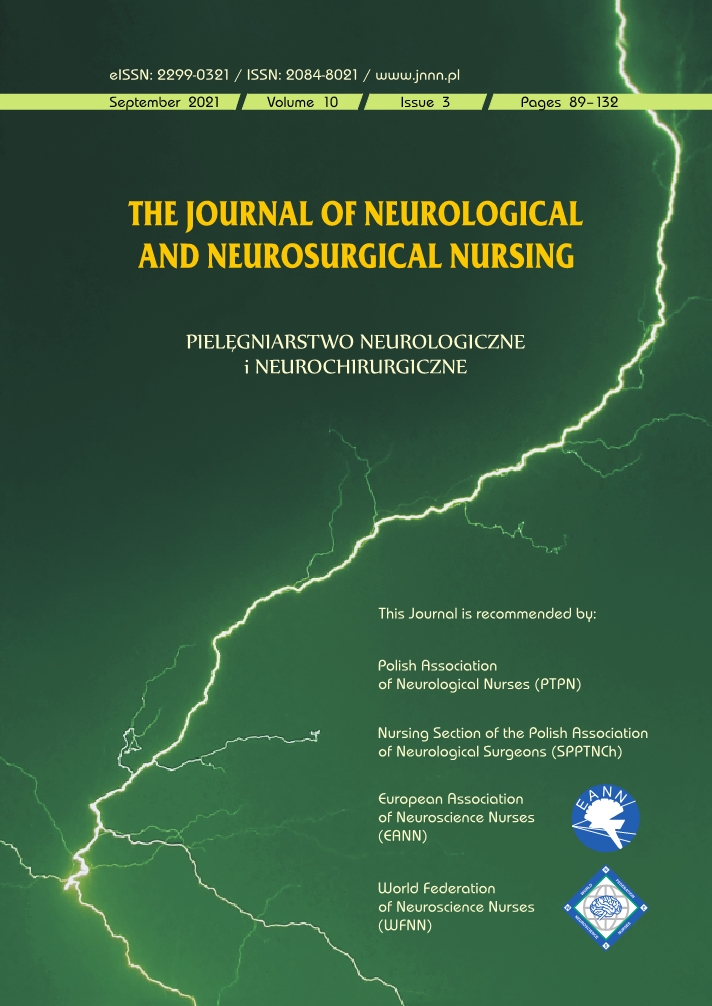Wiedza na temat padaczki wśród pacjentów objętych opieką środowiskową
DOI:
https://doi.org/10.15225/PNN.2021.10.3.3Słowa kluczowe
padaczka, wiedza, pacjentAbstrakt
Wstęp. Niedostateczna wiedza i błędne wyobrażenie na temat padaczki powoduje rozwój negatywnych postaw wobec pacjentów z padaczką, zwiększa stygmatyzację i problemy psychospołeczne, a w konsekwencji wpływa na ich jakość życia.
Cel. Celem przeprowadzonych badań było dokonanie oceny stanu wiedzy pacjentów Podstawowej Opieki Zdrowotnej na temat padaczki.
Materiał i metody. Badaniami objęto grupę 149 pacjentów trzech placówek świadczących Podstawową Opiekę Zdrowotną na terenie miasta Bydgoszczy. Badaną populację stanowiło 99 kobiet (66%) oraz 50 mężczyzn (34%). Przeważały osoby dorosłe, średni wiek respondentów wynosił 43,91 lat (SD = 13,03). W badaniach zastosowano metodę sondażu diagnostycznego, narzędziem badawczym był autorski kwestionariusz ankiety. Badania zostały przeprowadzone w modelu korelacyjnym. Do określenia istotności związku pomiędzy zmiennymi demograficznymi a wiedzą o padaczce wykorzystano test nieparametryczny rang Spearmana. Za istotny statystycznie przyjęto poziom istotności p < 0,05.
Wyniki. Zdecydowana większość badanych (97%) słyszała w swoim życiu o epilepsji i uważa, że posiada wiedzę na temat tej choroby (90%), a także zna główną jej przyczynę (76%). Ponadto większość badanych (96%, 97%) wie, że podczas ataku należy zapewnić choremu bezpieczne ułożenie oraz zabezpieczyć jego głowę przed urazami. Niestety gotowość udzielenia pomocy choremu wyraziło zaledwie 47% respondentów.
Wnioski. Większość badanych słyszała w swoim życiu o epilepsji i uważa, że posiada wiedzę na temat tej choroby. Ponad połowa respondentów była świadkami napadu padaczkowego. Gotowość do udzielenia pierwszej pomocy podczas napadu padaczkowego deklaruje blisko połowa ankietowanych. Zdecydowana większość badanych akceptuje osoby z padaczką w środowisku pracy, jak również w środowisku społecznym. Istnieje związek pomiędzy płcią, wiekiem i wykształceniem a niektórymi aspektami wiedzy na temat padaczki oraz prezentowaną opinią na temat tej choroby. (PNN 2021;10(3):105–111)
Bibliografia
Macit C., Clark P.M., Taner N., Bingol C., Mercanoglu G., Yuksel G. A survey on awareness, knowledge, and attitudes toward epilepsy in an urban community in Turkey. Niger J Clin Pract. 2018;21(8):979–987.
Singh S., Mishra V.N., Rai A., Singh R., Chaurasia R.N. Myths and Superstition about Epilepsy: A Study from North India. J Neurosci Rural Pract. 2018;9(3):359–362.
Yeni K., Tulek Z., Simsek O.F., Bebek N. Relationships between knowledge, attitudes, stigma, anxiety and depression, and quality of life in epilepsy: A structural equation modeling. Epilepsy Behav. 2018;85:212–217.
World Health Organization. Epilepsy. Retrieved July 14, 2021, from https://www.who.int/news-room/fact-sheets/detail/epilepsy.
Kuzmanova R., Stefanova I., Stambolieva K. Significance of noncompliance when treating patients with epilepsy. Neurol Neurochir Pol. 2018;52(2):215–221.
Saadi A., Patenaude B., Mateen F.J. Quality of life in epilepsy-31 inventory (QOLIE-31) scores: A global comparison. Epilepsy Behav. 2016;65:13–17.
Gołembiowska D., Gomuła A., Gryszka A. Ocena wiedzy i postaw padaczki wśród studentów uczelni wyższych — badanie ankietowe. Ann Acad Med Siles. 2006;4(60):302–307.
Zielińska A., Talarska D., Kłos E. Wiedza młodzieży gimnazjalnej na temat padaczki. Pielęg XXI w. 2006;3(16):135–137.
Dubelt J., Cybula-Misiurek M., Czerwińska-Pawluk I., Chrościńska-Krawczyk M., Zukow W. Education of the child with epilepsy as the element of its wellness’ improvement. J Educ Health Sport. 2018;8(3):369–381.
Shehata G.A., El-Lateef Z.A., Ghanem H.M., El-Masry M.A. Knowledge, attitude and practice regarding people with epilepsy among nurses. Aktualn Neurol. 2015;15(4):192–198.
Alhazzani A.A., Alqahtani A.M., Abouelyazid A. et al. Public awareness, knowledge, and attitudes toward epilepsy in the Aseer region, Saudi Arabia — A community-based cross-sectional study. Epilepsy Behav. 2016;63:63–66.
Kaddumukasa M., Kakooza A., Kayima J. et al. Community knowledge of and attitudes toward epilepsy in rural and urban Mukono district, Uganda: A cross-sectional study. Epilepsy Behav. 2016;54:7–11.
Al-Dossari K.K., Al-Ghamdi S., Al-Zahrani J. Public knowledge awareness and attitudes toward epilepsy in Al-Kharj Governorate Saudi Arabia. J Family Med Prim Care. 2018;7(1):184–190.
Kiwanuka F., Anyango Olyet C. Knowledge, attitude, and beliefs on epilepsy among adults in Erute South, Lira District, Uganda. Epilepsia Open. 2018;3(2):264–269.
Talarska D., Pomian-Śniedziewska A., Zielińska A. Wiedza i postawy studentów wobec chorych na padaczkę. Epileptologia. 2008;16(3):197–205.
Krishnaiah B., Alwar S.P., Ranganathan L.N. Knowledge, attitude, and practice of people toward epilepsy in a South Indian village. J Neurosci Rural Pract. 2016;7(3):374–380.
Almutairi A.M., Ansari T., Sami W., Baz S. Public knowledge and attitudes toward epilepsy in Majmaah. J Neurosci Rural Pract. 2016;7(4):499–503.
Al-Hashemi E., Ashkanani A., Al-Qattan H. et al. Knowledge about Epilepsy and Attitudes toward Students with Epilepsy among Middle and High School Teachers in Kuwait. Int J Pediatr. 2016;2016:1–15.
Kartal A. Knowledge of, perceptions of, attitudes and practices regarding epilepsy among medical students in Turkey. Epilepsy Behav. 2016;58:115–118.
Jansen P., Neininger M.P., Bernhard M.K. et al. Knowledge and attitudes about epilepsy: A survey of high school students in Germany. Seizure. 2017;51:139–144.
Al-Harbi A.F., Alsaid L.A., Parameaswari P.J. Primary school female teachers’ knowledge, attitude, and practice toward students with epilepsy in Riyadh, Saudi Arabia. J Family Med Prim Care. 2018;7(2):331–336.
Guekht A., Gersamiya A., Kaimovskiy I., Mizinova M., Yakovlev A., Shpak A. Attitudes towards people with epilepsy in Moscow. Epilepsy Behav. 2017;70(Pt A):182–186.
Teferi J., Shewangizaw Z. Assessment of knowledge, attitude, and practice related to epilepsy: a community-based study. Neuropsychiatr Dis Treat. 2015;11:1239–1246.
Pobrania
Opublikowane
Jak cytować
Numer
Dział
Licencja

Utwór dostępny jest na licencji Creative Commons Uznanie autorstwa – Bez utworów zależnych 4.0 Międzynarodowe.
Statystyki
Liczba wyświetleń i pobrań: 726
Liczba cytowań: 0
